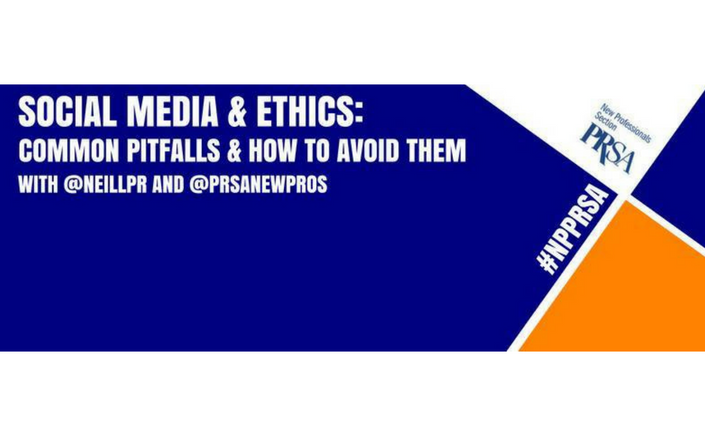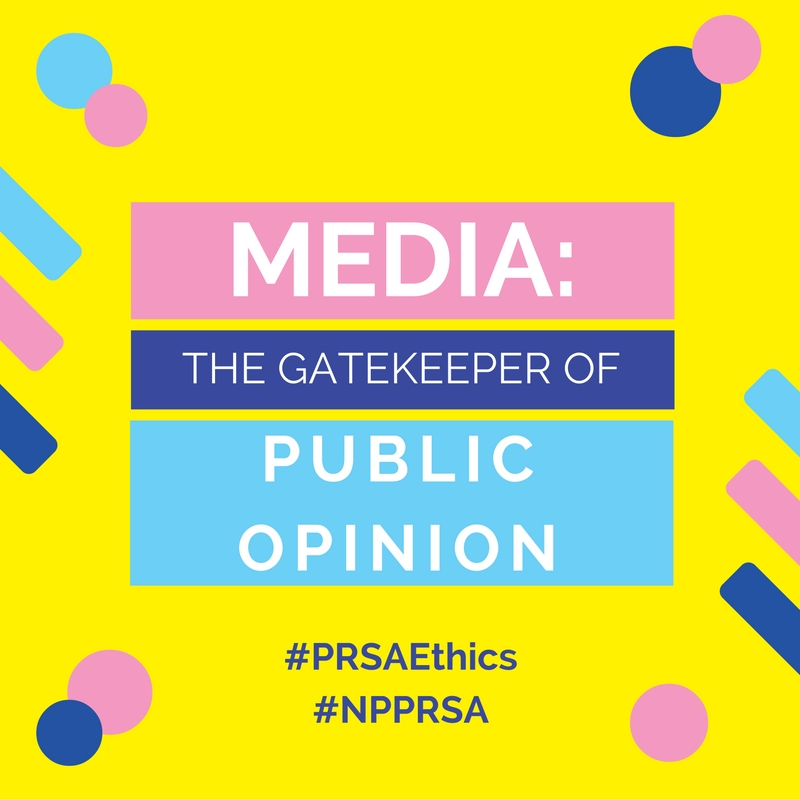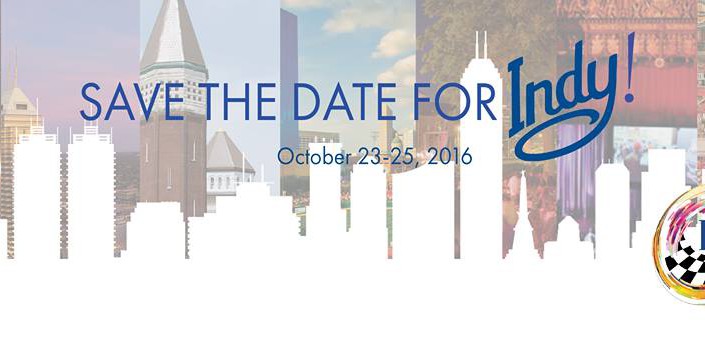September’s #NPPRSA Twitter Chat with Marlene Neill, Ph.D. focused on social media and ethics. Scroll below to read the recap.
September 2016 Twitter Chat Recap


September’s #NPPRSA Twitter Chat with Marlene Neill, Ph.D. focused on social media and ethics. Scroll below to read the recap.
Editor/Guest post note: The Edelman Immersion Program is a highly competitive program where participants spend 18 months rotating across different Edelman departments to learn the business and determine long-term career goals.
Are you a new PR pro looking to succeed in this fast-paced and ever-changing environment? Graduates and current participants of the Edelman Immersion Program have gathered their wisdom to share with PRSA New Pros. Take a look at what members from all three of the company’s Immersion classes had to share from their unique experiences.
Herschel Kissinger, Class of 2015 – Currently in Program
A piece of advice that I often need to remind myself of: nobody is a mind reader. Colleagues and mentors are willing to help you achieve your goals—if they know what those goals actually are. Don’t be afraid to start those conversations yourself.
From working across five different practices at Edelman, I’ve learned that we have an expert or specialist for nearly everything. If you’re starting a new project in an unfamiliar space, the good first question to ask is “Have any of my colleagues done this before?” Often a 15-minute conversation with a subject matter expert gets you a lot more information than an hour of Googling.
Molly Shaheen, Class of 2015 – Currently in Program
Allow yourself to think of your role as you thought of college. In a communications agency, your clients and projects are your curriculum and each is an opportunity to gain knowledge on new things.
During your career, you’re going to have those core accounts that you always work on, much like the core classes for your degree. If you navigate things right, you’ll have room to take a couple electives down the line. Keep your eyes open and raise your hand for projects that pique your interest and are outside of your day-to-day role.
Don’t forget what your professors preached – participation! Speak up in meetings, bring interesting research or insights to the table and ask your teammates thoughtful questions along the way. It will help make you stand out.
Lissa Pavluk, Class of 2013
Don’t underestimate the value of a mentor. Find someone a few levels above you who is willing to help you navigate complex situations, give sage advice based on their own experiences and help you understand how to best grow your career. Your HR department should be able to help you facilitate this if you have trouble identifying someone on your own. The best part? You may end up with not only a mentor, but a good friend!
Jenna Wollemann, Class of 2011
One of the most important things I learned my first year working was the importance of managing up (or simply put, making the lives of your managers easier). Entry level employees are expected to be one step ahead, paying close attention to project timelines and various tasks for the team. When I joined Edelman, I quickly learned that you sometimes have to over-communicate with managers and team leaders so they know what the status of your projects are and when they can expect various deliverables. Over-communicating and managing up can be tough at first, but managers have no way of knowing what’s going on unless you tell them.
Additionally, be resourceful and don’t be afraid to ask questions! These traits go a long way. It’s always better to raise your hand to your manager before diving into a task if you’re unsure about something. Also, don’t underestimate the power of your peers. Other colleagues at your level can be fantastic resources if you have questions or ideas, considering it’s likely they have encountered similar experiences or issues.
Interested in applying for Edelman’s Immersion Program? More information can be found here.
Ethics… it’s just a matter of right and wrong, correct? Yes, but there are layers to being an ethical professional. Remember when PR was deemed the profession of spin? We’ve come a long way since then and in today’s media landscape, where everything is picked apart and scrutinized, we must remain trustworthy.
 When covering ethics in public relations, there is a lot of mention of keeping the line of communication between the public and company, client and/or brand transparent, as well as legal. It’s a no brainer that public opinion is important but we must remember the gatekeeper, the middle man, better known as the media. Building trust between practitioner and the media is just as important because essentially, they are telling the public your story. One of PRSA’s core codes of conduct is the free flow of accurate and truthful information. That means building honest relationships with journalists, even if they become a close friend along the way. As ethical PR practitioners, we must play fair and keep an even working relationship between all members of the media. Yes, we should tailor each message depending on the interest of the publication and beat, but that doesn’t mean sending over confidential, inside information to a journalist just because you two are friends.
When covering ethics in public relations, there is a lot of mention of keeping the line of communication between the public and company, client and/or brand transparent, as well as legal. It’s a no brainer that public opinion is important but we must remember the gatekeeper, the middle man, better known as the media. Building trust between practitioner and the media is just as important because essentially, they are telling the public your story. One of PRSA’s core codes of conduct is the free flow of accurate and truthful information. That means building honest relationships with journalists, even if they become a close friend along the way. As ethical PR practitioners, we must play fair and keep an even working relationship between all members of the media. Yes, we should tailor each message depending on the interest of the publication and beat, but that doesn’t mean sending over confidential, inside information to a journalist just because you two are friends.
Being ethical doesn’t just mean avoiding bad situations. It is proactively doing what’s right, giving clear, correct, and complete information to the media while building meaningful relationships. Here are three essential rules to build trust between the media and the public:
As a PR professional, it is our primary job to communicate and disseminate information to the public. We are a resource and must be complete, accurate and timely at all times. Don’t be that PR person to hit up a journalist months before or after a issue is being printed with “new news” on the topic. They don’t care, you’ve missed your chance, and you’ve broken a tad bit of trust by wasting their time. We must remember that day to day, we work with a variety of people, companies, and industries that may not work in the same manner. Keep a trustworthy relationship with all stakeholders by meeting deadlines, responding to emails and phone calls, and fulfilling the duty of being a resource.
2. Focus on the relationship not the transaction
Trust comes with respect. If your primary connection with a person is based on press coverage, it is less likely they will come to you when they need a quote from an industry leader. How would you feel if a journalist clearly makes it known they primarily work with you because your company offers cool freebies or perks, you’d feel a little used. Don’t continuously send press releases and pitches without any other dialogue. Set time aside to really get to know the journalist and what they like, beyond their beat. Sometimes, working relationships are forced but to build solid relationships with the media remain open, transparent, and friendly.
3. Remember the Golden Rule
The Golden Rule simply states, “Do unto others as you would like them to do to you.” How would you feel if you were on deadline and someone didn’t give you critical information needed? What would you think if you gave a journalist cool information on a new campaign, and they left out the hook that made the story interesting? Ethical public relations can be much simpler if we keep the Golden Rule in the back of our minds. Treat your client, the media, and the public with respect by practicing public relations with the highest ethical principles.
 Jasmine L. Kent, a member of PRSA-LA, is a fan of all things food and beverage, pop culture, and media. Combining all three passions, Jasmine builds community through engaging online marketing and dynamic events as an integrated communications professional in Los Angeles, CA. Keep up with her on Twitter and Instagram at @LoveJasPR or visit LoveJasPR.com.
Jasmine L. Kent, a member of PRSA-LA, is a fan of all things food and beverage, pop culture, and media. Combining all three passions, Jasmine builds community through engaging online marketing and dynamic events as an integrated communications professional in Los Angeles, CA. Keep up with her on Twitter and Instagram at @LoveJasPR or visit LoveJasPR.com.

The PRSA New Professionals Section is very excited to announce our networking session during the upcoming PRSA International Conference in Indianapolis from Oct. 23-25!
PRSA New Pros will host a networking breakfast and discussion on Oct. 23 featuring:
We would love our members’ input on what you would like included during the networking time. Please comment below with any ideas around what would be most beneficial to you during the networking session. Feel free to also pre-submit questions you would like to ask during the Q&A portion, which will include discussion with other New Pros to help solve challenges you’ve faced professionally. You may also submit ideas and questions via email to Jess Noonan, Heather Harder and/or Ruthann Campbell or tweet us @PRSANewPros.
Please RSVP for the breakfast here.
We look forward to seeing you at #PRSAICON!
—The New Pros Committee Chairs
Diversity is one of the biggest employer buzzwords out there right now, but the truth is that PR has a big diversity problem. One of the main problems with workplace diversity is that it’s sometimes viewed as a top-down initiative meant to make the company look good, not to improve the workplace or services offered. New Pros, with their differing outlooks and definitions of what “diversity” is, can help solve PR’s lingering issue.
Original plans for diversity included hiring people of different races, backgrounds, genders, etc., and to have those groups equally represented within the workplace to create a diverse employee pool. But is that actually the thing to do to help better understand and provide for your clients and audiences or is that just checking off boxes and creating a fun illusion of inclusion and diversity? I’d say it’s the latter.
Today’s new pros are a great example of the cultural shift happening in America, and the world over. More and more of us come from blended backgrounds and we’re described as “an ethnically diverse generation who are team players, optimistic, confident, trusting of authority, rule-followers, achievers in school and generally achievement-oriented in everything they undertake.” Seeing, interacting with and working with people from diverse backgrounds is commonplace because that’s the world we’ve come of age in. We care more about diversity in ideas, philosophies and perspectives than how people look, where they’re from and whether there’s equal representation.
The biggest benefit of a diverse team is that it inspires creativity and productivity. Thoughtfully listening to and talking with those who see things and think about things in ways that you may not helps us to see new perspectives and think outside of our normal boxes. It almost goes without saying that there’s no such thing as being too creative in PR. The open flow of communication between employees of all backgrounds is important to effective brainstorming and problem solving and should be used by all teams, even if that means taking the brainstorming sessions into your own hands and on your own time.
In addition to being more productive and better problem solvers, a diverse team tends to adapt more easily. Whether that’s to new obstacles, changes within the team or changes to the project, adaptability is important to success, especially in PR, where things constantly change. Talking through problems and strategizing the best plan for what’s ahead is a key advantage that comes from bringing together people with varied perspectives and backgrounds to tackle a project.
Since diversity often be a bigger initiative put in place by executives or managers, it may seem like there’s nothing that a new pro can do to influence how diverse a team they are work on. There are plenty of things that today’s new pros can do to make diversity a common part of their their career development. When you have the opportunity, speak up about any coworkers whom you think would add a good, new perspective to a project you’re working on if there’s an opportunity for adding a new team member or seeking out their thoughts.When you’re in a position, maybe a little further along in your career, to make decisions on team structure, bring in members who think differently than you do and offer a different perspective.
New pros should also look outside the workplace to embrace diversity. Look for opportunities to embrace another culture, through festivals, celebrations, studying or simply interacting with those of another culture near you. Travel and experience new areas and traditions. Seek out friends of different backgrounds and ideas. Make diversity less about having equal representation or “checking the boxes” to make sure everything’s covered and more about being a well-rounded, open-minded professional.
 Robyn Rudish-Laning is a member of South Carolina’s PRSA chapter and is communications coordinator for the South Carolina Council on Competitiveness. Robyn is also a member of the New Professionals executive committee and is a two-time graduate of Duquesne University who currently lives in Columbia, SC. You can connect with her on LinkedIn or Twitter or read her blog here.
Robyn Rudish-Laning is a member of South Carolina’s PRSA chapter and is communications coordinator for the South Carolina Council on Competitiveness. Robyn is also a member of the New Professionals executive committee and is a two-time graduate of Duquesne University who currently lives in Columbia, SC. You can connect with her on LinkedIn or Twitter or read her blog here.